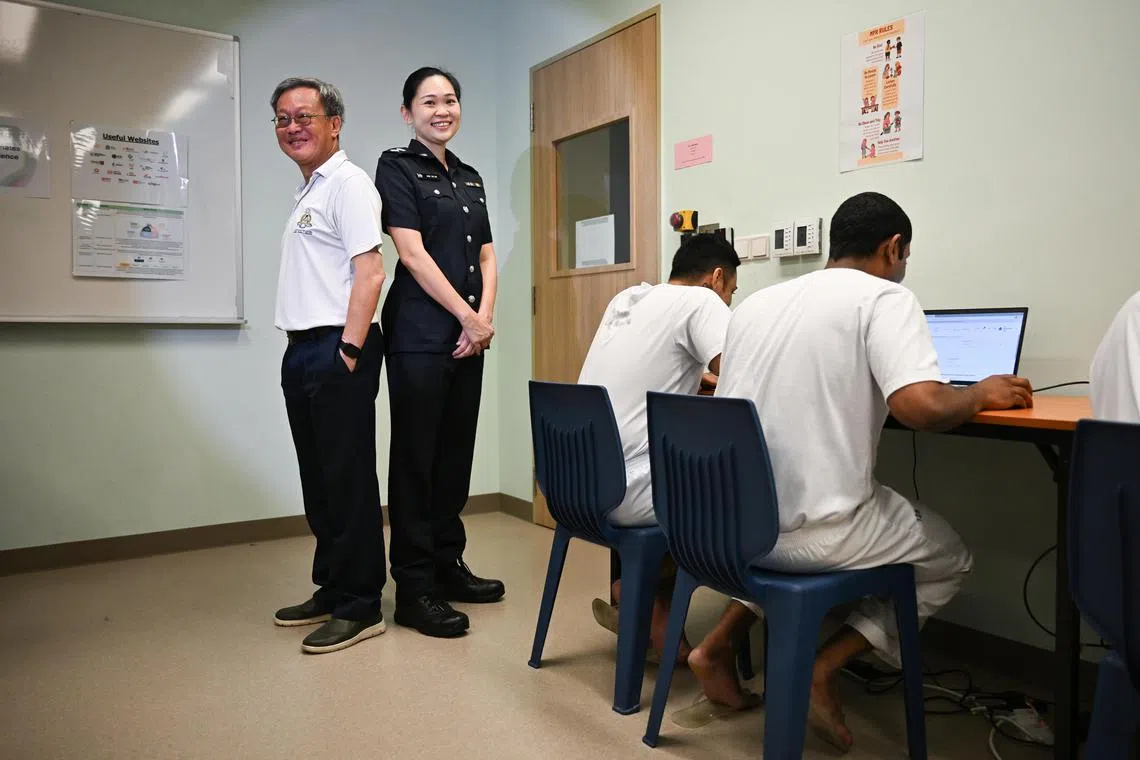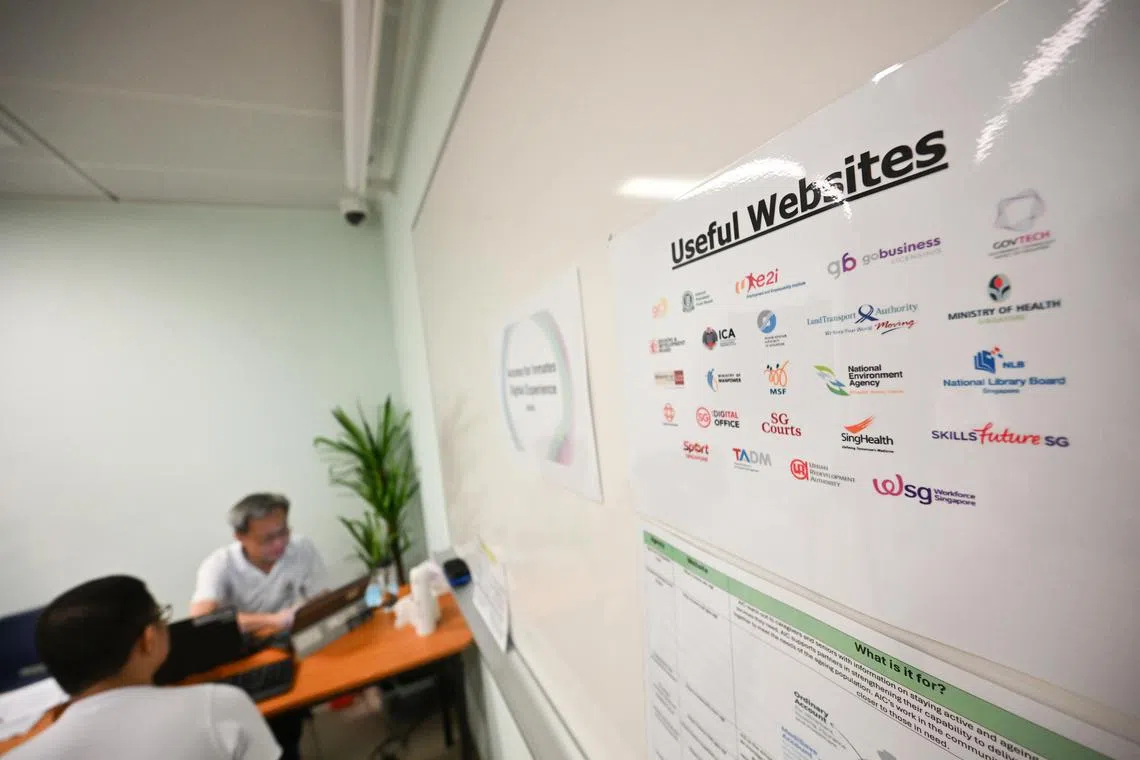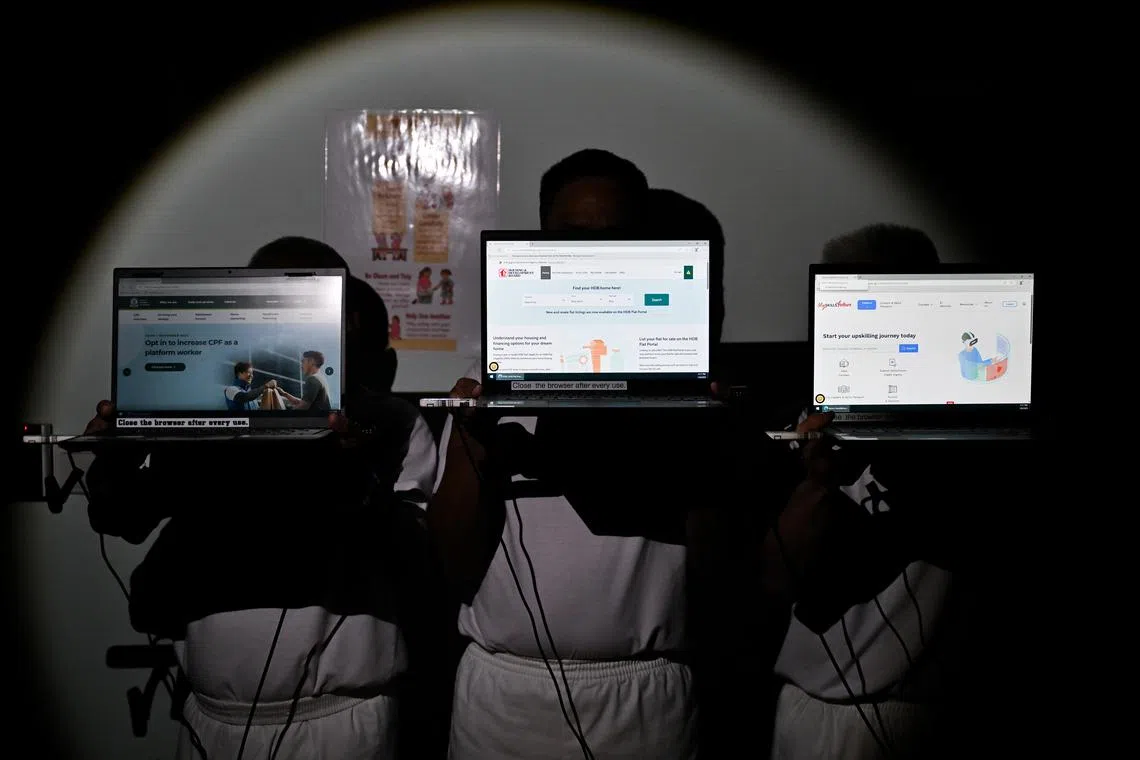Prison programme helps inmates prepare for a tech-savvy world
Sign up now: Get ST's newsletters delivered to your inbox

Service ambassador Andrew Cheang, (left) and DSP June Ngiam next to inmates accessing government e-services with their SingPass account in the terminals at Institution S2 Resource Centre.
ST PHOTO: LIM YAOHUI
SINGAPORE – Being away in prison means that inmates at the Singapore Prison Service (SPS) may find themselves at a loss when it comes to using online platforms after they are released.
That’s how an inmate at Institution S2 Resource Centre, known only as Ja, feels as he prepares to face a world that has changed digitally since he was incarcerated two years ago.
But an initiative called Project Access for Inmates Digital Experience (Aide) is helping him to brush up on his digital skills.
Led by SPS deputy superintendent (DSP) June Ngiam, Project Aide seeks to improve inmates’ digital access to selected government e-services. The initiative is part of SPS’ Corrections 2030
Corrections 2030 leverages technology and community partnerships to build the social, community and economic capital of inmates, with the aim of preventing reoffending and ensuring successful reintegration into the community after release.
Said DSP Ngiam: “Digital literacy is important in the current world. Inmates have no access to digital platforms and don’t know how to navigate them. Project Aide can better prepare them for reintegration into a digitalised society.”
Since September 2024, Institution S2 at Selarang Park Complex, which houses pre-release inmates, has been teaching inmates to use 14 selected government e-services. These services include Singpass and those provided by the Housing Board and Central Provident Fund.
As at December 2024, more than 300 inmates have benefited from the programme.

The programme is supported by service ambassador Andrew Cheang, who is at Institution S2 twice a week to guiding inmates on how to use the e-services.
ST PHOTO: LIM YAOHUI
Ja said: “I am very confident about navigating digital websites now. No problem!”
As inmates do not have access to mobile phones and cannot log in to Singpass using one-time passwords the way most citizens do, they have to rely on facial recognition. Previously, Ja was unaware that facial recognition was used as a means of authentication, but he knows now, having learnt about it from Project Aide.
The programme is supported by SPS service ambassador Andrew Cheang, who is at Institution S2 twice a week to guide inmates on how to use the e-services.
Inmates are taken into a room with laptops for them to use, in groups of three to five. There, they may access the e-services and ask Mr Cheang for assistance with any issues they might face, such as resetting their Singpass passwords.
To help him in his task, Mr Cheang underwent a three-day training programme with government platform ServiceSG to expand his knowledge of citizenry services and policies.
Ja said: “Project Aide has taught me well. The service ambassador is easy to understand, and his instructions are clear.”
Mr Cheang explained that for some of the older inmates, it is their first time accessing digital platforms, so they are apprehensive.
“Some have never used a laptop before,” said Mr Cheang, who allays their fears by telling them to take it slow and helping them every step of the way, until they are confident enough to access the platforms by themselves.

Surveys are conducted periodically to get inmates’ feedback on Project Aide. Generally, they find it effective in supporting their reintegration journey.
ST PHOTO: LIM YAOHUI
Mr Cheang has also helped an inmate who had applied for permanent resident status for his wife and daughter before he was incarcerated.
He said: “He was anxious to know the status of the application. Through Project Aide, he was able to check the Immigration and Checkpoints Authority website and saw that the application was successful. He lit up with happiness, and I felt very fulfilled seeing him so.”
Surveys are conducted periodically to get inmates’ feedback on Project Aide. Generally, they find it effective in supporting their reintegration journey.
The survey also collects data on other e-services inmates hope to access. Most commonly asked for is the Land Transport Authority website, as inmates want to check on the status of their driving licences.
SPS plans to expand Project Aide to more websites and institutions in January 2025, starting with Institution A4, the women’s prison; and Institution B5, which houses mainly repeat drug offenders. Both are in Changi Prison Complex.


